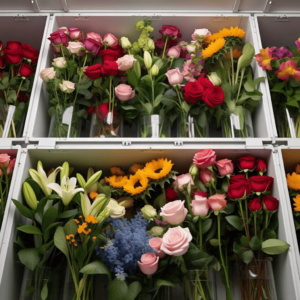When you think of refrigerated containers, your mind might immediately jump to ice cream or frozen foods. While it’s true that reefer containers (the term for refrigerated shipping containers) are essential for keeping frozen treats at the perfect temperature during transit, their applications go far beyond that. In fact, many industries rely on refrigerated containers to safely store a wide variety of goods that require temperature control.
Let’s take a look at some surprising items that rely on refrigerated containers.
The pharmaceutical industry has a stringent need for temperature-sensitive storage, and refrigerated containers play a pivotal role. Vaccines, insulin, and other biologics need to be kept within specific temperature ranges to maintain their efficacy. Reefer containers are vital for ensuring that these life-saving products arrive at their destination without losing potency.
Moreover, the storage of medical supplies such as blood, tissues, and organs for transplants also depends on precise temperature control. The consistent cold environment of refrigerated containers ensures the integrity and safety of these sensitive items.
It might surprise you to learn that the global flower industry is another significant user of refrigerated containers. Fresh flowers, especially those transported internationally, have a very short lifespan and require temperature controlled environments to maintain their freshness. Flowers are often stored and transported in reefer containers to preserve their vibrancy and prevent wilting. The right cold storage conditions also help slow the natural aging process, ensuring that flowers arrive at their final destination in pristine condition.

While electronics might not immediately come to mind when considering refrigerated containers, sensitive components such as semiconductors and computer chips can be damaged by high temperatures. These items require controlled environments to ensure that heat doesn't interfere with the production process or cause defects.
Luxury perfumes and cosmetics are delicate products that need to be carefully handled to prevent spoiling. Extreme temperatures can affect the scent, texture, and overall quality of these products. By using refrigerated containers, companies can ensure that their beauty products stay at the optimal temperature, retaining their quality and integrity until they reach the consumer.
While we often associate refrigerated containers with soft drinks and alcoholic beverages, there are other surprising drinks that rely on temperature-controlled storage. Fresh juices, dairy products, and even some types of tea and coffee require refrigeration to prevent spoilage and preserve taste. These beverages are particularly sensitive to temperature fluctuations, which is why reefers are so important for this industry.
Specialty meats such as pâtés, salamis, and smoked fish, as well as artisan cheeses, are another set of surprising products that benefit from refrigerated containers. These foods often require consistent cold storage to maintain their taste, texture, and quality. Without temperature control, these delicacies could spoil, affecting their flavour and, in some cases, making them unsafe to eat.
Fine art and valuable antiques are typically fragile and sensitive to environmental conditions. Extreme temperatures can lead to cracking, warping, and degradation of materials such as wood, canvas, and metal. As such, many museums, galleries, and auction houses rely on reefers to maintain a stable and controlled environment when storing or shipping high-value items. These temperature controlled containers ensure that art and antiques arrive in the same condition they left.

Similar to flowers, certain plants and seeds require a regulated temperature for safe storage. Seeds, for instance, can lose their viability if exposed to excessive heat or humidity. In addition, young plants or horticultural products may need refrigeration to prevent wilting or premature blooming. Reefer containers offer the protection these products need to survive long-distance shipping.
While chocolate is usually stable at room temperature, certain varieties, especially premium or artisanal chocolates, can be very sensitive to temperature. Heat can cause chocolate to melt or bloom (a whitish coating that forms when cocoa butter separates). To ensure that chocolate products maintain their smooth texture and glossy finish, refrigerated containers are often used.
Live seafood, such as oysters, clams, lobsters, and even live fish, requires refrigerated containers to keep them alive and fresh. The right temperature controls are crucial in preventing death or spoilage. These refrigerated containers keep live seafood at optimal temperatures, preserving their health and quality.
Refrigerated containers, or reefer containers, are indispensable in a wide range of industries far beyond the realm of frozen foods. From pharmaceuticals and electronics to flowers and luxury goods, temperature control is a key part of global supply chains.
Whether it's keeping your favourite ice cream cold or preserving the freshness of exotic flowers, these versatile containers are essential to many aspects of modern commerce.